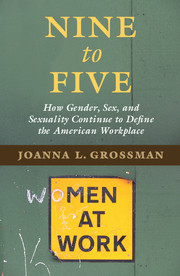Book contents
- Frontmatter
- Dedication
- Contents
- Foreword
- Acknowledgments
- Introduction
- PART I WHAT IS SEX DISCRIMINATION?
- PART II SEXUAL HARASSMENT
- 12 Workplace Affairs and Sexual Favoritism
- 13 Lolita at the Office
- 14 Sex Talk in the Writers’ Room
- 15 Sex Behind Bars
- 16 When the Supervisor Bullies Only Women
- 17 The Equal Opportunity Harasser
- 18 Periodontal Perils
- 19 Punishing Effeminacy
- 20 Late-Night Affairs with David Letterman
- 21 Why Herman Cain Has Not Been Able to Talk His Way Out of His Exploding Sexual Harassment Scandal
- 22 Why Hostile Environment Harassment Is a “Continuing Violation”
- 23 When Sexual Extortion Is Successful
- 24 The Consequences of Failing to Complain about Harassment
- 25 Who Is Responsible for Sudden, Severe Harassment?
- 26 Chinks in the Harassment Law Armor
- 27 Do Employer Efforts Prevent Harassment or Just Prevent Liability?
- 28 Who's the Boss?
- 29 Costly Mistakes
- 30 Hands Off the Merchandise
- PART III PREGNANT WOMEN AND MOTHERS AT WORK
- PART IV FEMALE BREADWINNERS AND THE GLASS CEILING
- Conclusion
- Notes
- Index
16 - When the Supervisor Bullies Only Women
from PART II - SEXUAL HARASSMENT
Published online by Cambridge University Press: 05 May 2016
- Frontmatter
- Dedication
- Contents
- Foreword
- Acknowledgments
- Introduction
- PART I WHAT IS SEX DISCRIMINATION?
- PART II SEXUAL HARASSMENT
- 12 Workplace Affairs and Sexual Favoritism
- 13 Lolita at the Office
- 14 Sex Talk in the Writers’ Room
- 15 Sex Behind Bars
- 16 When the Supervisor Bullies Only Women
- 17 The Equal Opportunity Harasser
- 18 Periodontal Perils
- 19 Punishing Effeminacy
- 20 Late-Night Affairs with David Letterman
- 21 Why Herman Cain Has Not Been Able to Talk His Way Out of His Exploding Sexual Harassment Scandal
- 22 Why Hostile Environment Harassment Is a “Continuing Violation”
- 23 When Sexual Extortion Is Successful
- 24 The Consequences of Failing to Complain about Harassment
- 25 Who Is Responsible for Sudden, Severe Harassment?
- 26 Chinks in the Harassment Law Armor
- 27 Do Employer Efforts Prevent Harassment or Just Prevent Liability?
- 28 Who's the Boss?
- 29 Costly Mistakes
- 30 Hands Off the Merchandise
- PART III PREGNANT WOMEN AND MOTHERS AT WORK
- PART IV FEMALE BREADWINNERS AND THE GLASS CEILING
- Conclusion
- Notes
- Index
Summary
Thomas Harvey shouted at his subordinate female employees, and he did so frequently, profanely, and often in public. The shouting had no sexual content and did not involve derogatory language about women. But, the record suggests, only women were subjected to it, at least in its most extreme form.
In its decision in EEOC v. National Education Association (NEA), the U.S. Court of Appeals for the Ninth Circuit held that the plaintiffs could proceed to trial on their sexual harassment claim. That decision garnered headlines because neither sexual behavior nor language with sex-specific content was alleged. To those familiar with the law, though, this is not news. Indeed, the fact that the media took note of the case illustrates the wide gap between popular perceptions of sexual harassment law and the actual law of sexual harassment.
In this case, that law was simple and well established: Title VII bans sex discrimination in the workplace. And that ban has long been understood to encompass sex-based harassment – hostile or abusive behavior targeted at employees of one sex, whether or not it is sexual in nature.
Thus, the Ninth Circuit was entirely right to allow this case to go forward.
THE BOSS'S TREATMENT OF WOMEN AT THE NEA-ALASKA
The alleged harasser, Thomas Harvey, was the executive director of NEA-Alaska, a labor union representing teachers and other public school employees. Plaintiffs Carol Christopher, Julie Bhend, and Carmela Chamara held various positions in the union subordinate to Harvey. According to testimony of plaintiffs and several other witnesses, Harvey routinely yelled at the plaintiffs with “little or no provocation.” Worse, his shouting rants were often accompanied by aggressive physical gestures like lunging at, pumping fists at, invading the personal space of, and grabbing plaintiffs while barking commands or complaints at them. Plaintiff Christopher described an incident, for example, where Harvey screamed profanely at her for not reading her work e-mail while away (on an approved day off) visiting her dying sister.
Each plaintiff testified that Harvey's conduct rendered the work environment physically and verbally threatening – so much so that one of them did not seek pay for overtime she had worked because she “was too scared of Mr. Harvey to turn [the records of her overtime hours] in to him.”
- Type
- Chapter
- Information
- Nine to FiveHow Gender, Sex, and Sexuality Continue to Define the American Workplace, pp. 101 - 105Publisher: Cambridge University PressPrint publication year: 2016

